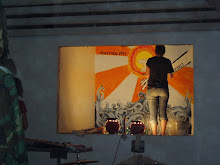Not Charity
I'm very grateful to all these organizations in the United States, especially the private and religious organizations. I appreciate the food and clothing they send. I thank them sincerely for their willingness to help, and I know they do it with great love. But I'd also like to say that this relationship–where we're dependent on the goodwill of outsiders–isn't the kind of relationship we'd like to have.... We're not going to solve our problem through handouts. Because our problem is a social one. And until we change this system, all the charity in the world won't take us out of poverty.
- Elvia Alvarado
Don't Be Afraid Gringo: A Honduran Woman Speaks from the Heart
This was the Voice in my daily Sojourner e-mail. I think about this all the time, and it leaves me confused as to what my action should be in regards to this type of charity. I am not going to be changing the problematic economic system of any country soon, so do I continue to give food and clothing? Isn't it perpetuating their problem? But if I do not, am I turning a blind eye to their need? I think it has to be some sort of combined effort. While we are providing for their more immediate needs, like food and clothing, shouldn't we also be constantly working on the root of the problem-- the system that created the impoverished downtrodden and oppressed?
My friend Paul gave me a tape of field recordings from his time in New Orleans, and the paper in which he wrapped it promoted Common Ground Collective. Common Ground Collective is a community-initiated volunteer organization that provides immediate relief as well as long-term rebuilding support for the people of New Orleans. What strikes me about this organization is their slogan, "Solidarity not Charity." I think solidarity looks more like figuring out what's wrong with the system and fixing it so that it doesn't keep people stagnant. Now I'm thinking of Muhammed Yunus microcredit..
Hmm, perhaps more on this later, I've got to be somewhere.
Meanwhile, check this out.
One of their projects is bioremediation (The Meg Perry Healthy Soil Project):
"The greater New Orleans area is home to oil and chemical industries that generate and store thousands of tons of toxic chemicals. These chemicals are stored in fuel tanks, warehouses, industries, gasoline stations, dry cleaners, auto-repair businesses, in the garage and under the kitchen sink. When hit by the floodwaters and hurricane winds of Katrina and Rita, many of these chemicals floated out of their storage locations and into adjacent neighborhoods. These toxic spills will create long-term health risks to people in contaminated areas unless soil and water are fully cleaned up so that all toxins are removed, broken down into harmless chemicals, or tightly bound so that areas are safe for our most vulnerable populations: children playing in their yards and schools, and the elderly whose physical health may be compromised."
They look to correct this with testing, remediation, and planting things that promote soil health...
[commongroundrelief.org]
salaam
- Elvia Alvarado
Don't Be Afraid Gringo: A Honduran Woman Speaks from the Heart
This was the Voice in my daily Sojourner e-mail. I think about this all the time, and it leaves me confused as to what my action should be in regards to this type of charity. I am not going to be changing the problematic economic system of any country soon, so do I continue to give food and clothing? Isn't it perpetuating their problem? But if I do not, am I turning a blind eye to their need? I think it has to be some sort of combined effort. While we are providing for their more immediate needs, like food and clothing, shouldn't we also be constantly working on the root of the problem-- the system that created the impoverished downtrodden and oppressed?
My friend Paul gave me a tape of field recordings from his time in New Orleans, and the paper in which he wrapped it promoted Common Ground Collective. Common Ground Collective is a community-initiated volunteer organization that provides immediate relief as well as long-term rebuilding support for the people of New Orleans. What strikes me about this organization is their slogan, "Solidarity not Charity." I think solidarity looks more like figuring out what's wrong with the system and fixing it so that it doesn't keep people stagnant. Now I'm thinking of Muhammed Yunus microcredit..
Hmm, perhaps more on this later, I've got to be somewhere.
Meanwhile, check this out.
One of their projects is bioremediation (The Meg Perry Healthy Soil Project):
"The greater New Orleans area is home to oil and chemical industries that generate and store thousands of tons of toxic chemicals. These chemicals are stored in fuel tanks, warehouses, industries, gasoline stations, dry cleaners, auto-repair businesses, in the garage and under the kitchen sink. When hit by the floodwaters and hurricane winds of Katrina and Rita, many of these chemicals floated out of their storage locations and into adjacent neighborhoods. These toxic spills will create long-term health risks to people in contaminated areas unless soil and water are fully cleaned up so that all toxins are removed, broken down into harmless chemicals, or tightly bound so that areas are safe for our most vulnerable populations: children playing in their yards and schools, and the elderly whose physical health may be compromised."
They look to correct this with testing, remediation, and planting things that promote soil health...
[commongroundrelief.org]
salaam


0 Comments:
Post a Comment
Subscribe to Post Comments [Atom]
<< Home